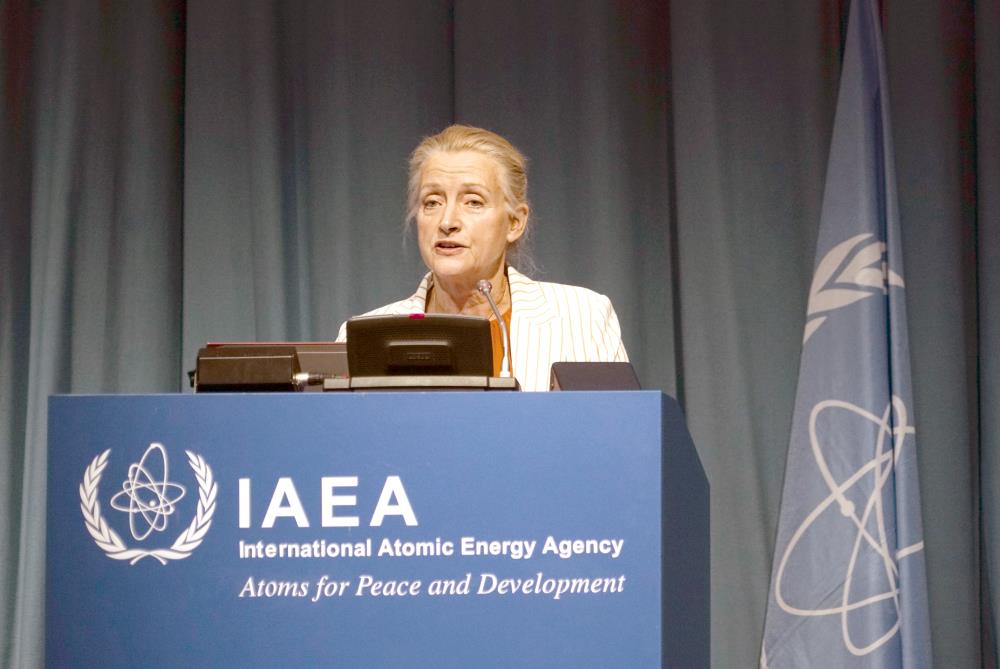At IAEA conference, nuclear industry says it is ready to deliver a low-carbon future
7 October 2019
Today at the International Conference on Climate Change and the Role of Nuclear Power Agneta Rising, Director General of World Nuclear Association said;
“The nuclear industry is committed to delivering what it needs to do to save our planet from climate change. Our technology is ready, our supply chain is ready, and our people are ready.
But to achieve this we must have action from governments to create the conditions needed to allow nuclear energy to deliver its potential.”

(Agneta Rising addresses the Climate Change and the Role of Nuclear Energy conference at the IAEA, Vienna)
Agneta Rising delivered this message in a keynote speech at the International Conference on Climate Change and the Role of Nuclear Power being held at the headquarters of the International Atomic Energy Agency in Vienna. Jointly organized by the IAEA and the OECD’s Nuclear Energy Agency, the conference will discuss nuclear power as a low-carbon energy source, and its role in combating climate change and achieving the UN’s sustainable development goals.
Nuclear avoids the emission of more than 2500 million tonnes of carbon dioxide every year, compared to fossil fuels. This is equivalent to removing about 400 million cars from the world’s roads.
Nuclear’s unique characteristics mark it out from other low-carbon options. It is reliable, generating 24/7 in all weathers and seasons. It provides rapid large-scale decarbonization, with reactors starting operations since 2000 taking on average 5-7 years to construct, with more than a quarter completed in under 5 years. It is also cost competitive, particularly if its unique attributes (low-carbon, reliable) are rewarded, and systems costs are included for all forms of generation.
Over the last five years the rate at which new nuclear capacity has been added to the grid has doubled. But to deliver a low-carbon energy mix fast enough to avoid the worst effects of climate change the rate of new nuclear additions now should triple to enable the industry to meet its Harmony goal to provide at least 25% of the world’s electricity before 2050.
The importance of nuclear energy for combating climate change and the need for reform to allow this to happen is increasingly recognized by international organizations.
The International Energy Agency's (IEA) recent report Nuclear Power in a Clean Energy System stated that a failure to invest in existing and new nuclear plants in advanced economies would have implications for emissions, costs and energy security. It concluded that strong policy support is needed to secure investment in existing and new nuclear plants and that policy reform is needed to ensure nuclear can compete on a level playing field.
The IAEA has concluded that the variety of national regulatory requirements causes many drawbacks for the entire nuclear industry, including developers, vendors, operators and even regulators themselves. This results in increased costs and reduced predictability in project execution.
Agneta Rising said;
“Nuclear reactors are the low-carbon backbone of the electricity system, operating in the background, day-in and day-out. Often out of sight and out of mind, they are the silent giants we rely upon daily.
Governments are called upon to take action to allow the nuclear industry to deliver the Harmony goal, so that the world can meet the climate challenge”
Notes to Editors
World Nuclear Association is the international organisation that represents the global nuclear industry. Its mission is to promote a wider understanding of nuclear energy among key international influencers by producing authoritative information, developing common industry positions, and contributing to the energy debate, as well as to pave the way for expanding nuclear business.
For press queries, please contact:
Jonathan Cobb
press@world-nuclear.org
+44 7719 329790
+44 20 7451 1536